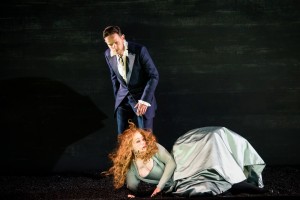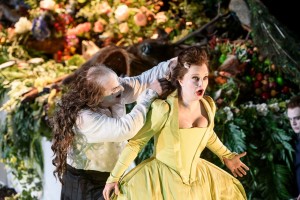In one of my many eyebrow raising conversations with the great late Dame Joan Sutherland, who graced the Glyndebourne stage to such acclaim, she told me she had no great liking for counter tenors. Glancing at a photograph of her in a commemorative book during the interval during this extraordinary production of Handel’s Saul, I wondered whether if she had been in the audience to hear Iestyn Davies sing David her views would have been shaken, and certainly stirred.
This still young man gives yet another faultless performance that leaves me scratching my head at those who find this type of voice not their afternoon tea. Perhaps they should skip a season or two of lacklustre evenings in certain opera houses and save up the cash for a Saul ticket at Glyndebourne to discover what they are missing. In this production Davies (main picture) is charged with subdued, subtle acting, in contrast to the wildness required of the powdered doyens of this quasi Biblical world and particularly the choreographed dancers with their stupid grins and goofy moves. The passion and pathos come from the voice and although he does have to join in the occasional bit of daft movement his is the psychological balance to contrast (again) the imbalance of Saul’s mind. He is allowed to have a good snog with Jonathan, indulging in the penchant for such a portrayal of their relationship, but apart from this there is no need for messing around.
Christopher Purves
His singing is rock solidly secure but more importantly rich in emotion and the ability to embrace the listener in a way no spoken word ever could, with the virtuosity to move seamlessly from pathos and sublime melancholy to abundant joy. Davies has seen his star rapidly ascend to be the must-cast counter tenor toast and as such he has the (skill?) and luxury of choosing a tantalising selection of musical and dramatic roles, such as recently Farinelli and the King and a song cycle Nico Muhly. Here as that most famous of giant killers, the young soldier David, we get a feel of his varying feelings towards Saul’s daughters Michal and Merab and their brother Jonathan but his direction (I assume) prohibits more florid expressiveness. Far stronger is the expression of their attitudes and affections (and intentions) towards David.
Australian director Barrie Kosky has created an intriguing and intoxicating world that contrasts the enlightenment and excesses of the Baroque world, the solemnity and surrealism of period Biblical oratorio and the vogue for slightly outlandish interpretation with faithfulness to the music.
Kosky gives his audience an endless feast for the eye including an actual one with the opening tableaux groaning under the exuberance of fruits, flowers, game and, then, the bloodied body of David fresh from slaying Goliath. This is then completely contrasted with a barren black landscape where Saul, abandoned by his god and having evoked the spirit of the dead prophet Samuel, and then the battlefield where the Israelites have been wiped out by their enemies.
Iestyn Davies and Sophie Bevan
Saul turns to hell having been abandoned by Jehovah and the production similarly has no difficulties in turning to the dark side to portray the king’s descent into a form of madness, wracked by doubts and insecurities, eaten away by envy and suspicion and incapable of listening to any other voice other than that ripping his brain apart. In the magnificent acting hands of Christopher Purves this is all brought to dramatic life in a way that just has you transfixed. This man just gets better and better and is the embodiment of the actor-singer who veers exquisitely just on this side of larger than life performance. In a lesser master’s hands this performance could be over the top but here it is knuckle-clenching, deeply psychologically charged character acting. Those who have been lucky enough to witness some of his milestone performances in Wales, from baked bean bonanza Berg’s Wozzeck, for example, to the recent Pountney protrusive Pelléas et Mélisande, Purves’ career has been, and continues to be, a delight to follow.
With his roots in Carmarthenshire and based in his home town of York, Davies’ visits to Wales are less numerous than Purves but we have enjoyed performances such as his Handel with Jephtha at WNO and I am sure a postponed concert at the Royal Welsh College of Music & Drama must be due to be rescheduled.
Christopher Purves and Paul Appleby
Jonathan is sung with a sad innocence by the young American tenor Paul Appleby and has possibly the least developed characterisation by Kosky, or perhaps the most difficult to realise on stage? What really does make Jonathan tick? What are his real motivations for defending David? No such problems with Lucy Crowe as an at first haughty and nasty Merab who sort of sees the light while Sophie Bevan is exploding with youthful joy and pretty much downright lust for the boy hero. Benjamin Hulett is a splendidly creepy jester, with Hobbit legs, who acts as commentator as well as a jabbing thorn in the flesh as the tragedy unfolds.
Christopher Purves and Lucy Crowe
Christopher Purves and John Graham-Hall
There are moments of zany magic, such as Handel appearing through the black, almost slag heap, floor, playing a rotating keyboard and then the hermaphroditic Witch of Endor, sung by John Graham-Hall, emerging again through the ground to suckle Saul with milk and prophecy.
Whether delivering Handel’s feverishly powerful fugues or Kosky’s lip-pursing imaginations Glyndebourne’s chorus is in glorious form while Ivor Bolton and the Orchestra of the Age of Enlightenment drew my ear and eye from stage to pit in equal measure.
Until 29 August. Box office 01273 815000, www.glyndebourne.org
Photography Bill Cooper




